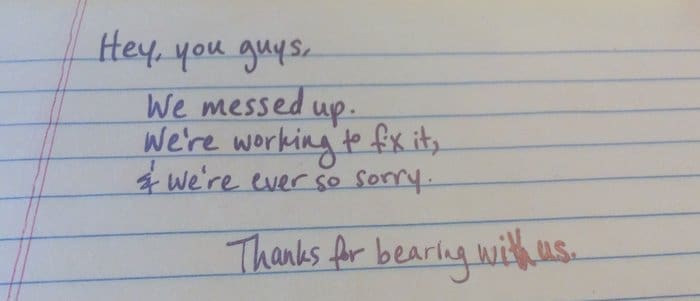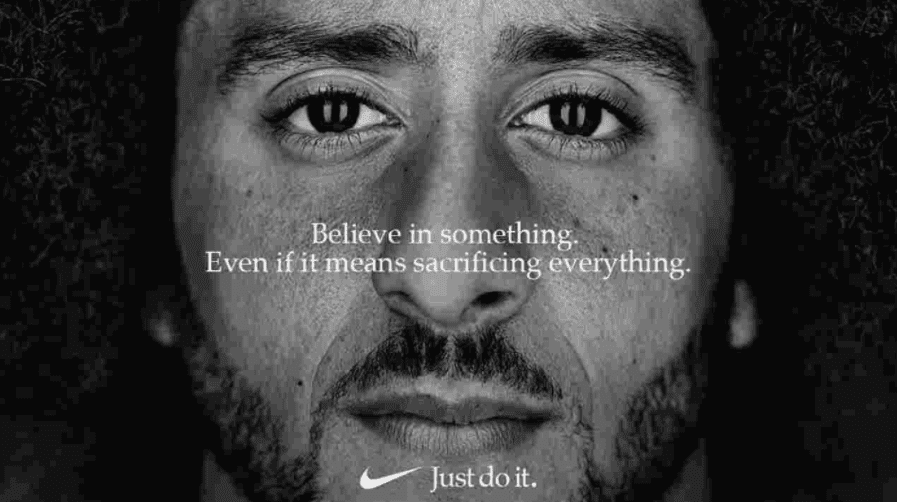Mistakes: We’ve all made a few.
In prepping this post, as usual, I’ve done some research on how and if peers propose public apologies in the social sphere.
And, as usual, I’ve had song lyrics arise unbidden in my mind’s ear.
Happens all the time. All. The. Time. They’re the voices in my head, I guess.
Mistakes…I’ve made a few.
Just to be sure, I googled these uninvited lyrics.
I thought it was from Ol’ Blue Eyes himself.
But before I could get to My Way by Sinatra, I had to pass through Fetty Wap (like you do, right?) and Queen. Go figure.
Welp. Frank never says “mistakes” in the official lyrics, as per Google Play. He says,
Regrets, I’ve had a few.
It was Freddie Mercury, lead singer of Queen, and anthemic hero of stadium sports everywhere, who said,
And bad mistakes, I’ve made a few…
I’ll come back to the lyrics lesson later when it becomes apropos. It will. I promise.
Minor Mistakes, Confusions, and Missed Connections
Ever been married?
Or worked closely with somebody whose first language wasn’t English?
Sometimes, it’s as if your spouse’s first language isn’t English.
And, as sure as the rent’s due, they think the same of you, too.
But if you both remain calm and/or revisit the topic at a later time, you usually find that you were both saying the same thing.
You were just using different words.
One of you was coming around the dark side of the moon to make their point.
And, one (or both) of you was so dead-set on being heard — “Just Listen to ME!” — that, perhaps, you didn’t bother to extend the same courtesy.
And so, in the euphemisms of human relationships, we commonly call that “getting sideways” or “getting our wires crossed.”
These sorts of misunderstandings happen with clients, followers, and fans, too.
Especially if you mix in an interactive voice response (IVR) system at the call center.
If you follow me on Twitter, or saw my previous blog post about serving your customers on social media, you know that I don’t call an 800-number unless I have my TweetDeck open.
If the IVR hold time is long enough that I can tweet at that same company’s Twitter desk — which is not yet fully integrated into the customer service function and likely in a different country, let alone department.
I’ve learned I have an odds-on chance at getting satisfaction sooner and better from the Twitterers than from the phone call.
Quick apologies followed by action make great customer service.
The Twitterers in these instances, across brands (except my previous health insurance company who never bothered to respond) begin with an apology.
Then, they take it offline, backchannel, as in private, not public, and get it off their feed.
We’re so sorry you have to go through that. Can you DM us with your email and we’ll be glad to help you?
Easy enough, right?
Apologizing Is Not Necessarily An Admission of Guilt.
I don’t know about you, but I learned that in my teens. “I’m sorry that you feel that way.”
Or, “I regret if that’s how my actions made you feel, but that certainly wasn’t my intention.” A little lawyer.
No less than the CCO at ConAgra Foods, Jon Harris, says essentially the same thing in this post-VW-announcement breakdown from PR Week.
An apology immediately shows that you’ve acknowledged that something wrong has occurred. Some people think that apologizing is equivalent to accepting liability, but it is possible to be regretful for an incident even if something is not your fault. ~ Jon Harris
This is where we get back to the Sinatra lyrics.
After Mr. Sinatra croons about having a few regrets, he clarifies in that cocky self-assured manner we all adore-envy in our Hollywood-types:
But then again, too few to mention
As for Mr. Mercury and singing about bad mistakes and sand being kicked in his face, that song does not in any way entail an apology.
That song is a strident clarion announcement of triumph.
Originally meant for the LGBTQ community, it was long ago co-opted for football, basketball, and arena sports.
Who’re widely known to be supportive of the LBGTQ community. Go figure.
But, Then Again, Some Mistakes Are Catastrophic.
Since folks have been walking upright, but especially since the Industrial Revolution, mistakes in judgment and equipment, from simple miscommunication to straight-up moral bankruptcy (and even little bitty vulnerable rubber O-rings) have led to tragic, far-reaching, irrevocable loss of life, limb, and treasure.
Just give a gander to these examples from recent history:
The Triangle Shirtwaist Factory Fire
Union Carbide: Bhopal Disaster
Exxon Valdez Oil Spill
The Housing Crisis, as portrayed in The Big Short
No Apologies Were Ever Made.
I’ll let you search the annals of history for those apologies.
If you find them, they’re gritted-teeth, weasel-worded, tight-spirited utterances with all the disgrace and chagrin of a three-year old caught with melted bits of chocolate and cookie crumbs on her face.
That was before social media. Mistakes and major muck-ups are in as steady a supply as ever.
Apologies Are on the Uptick.
Let’s give a look to this recent misstep: VW Caught Cheating on US Emissions Tests
The chief executive of the Volkswagen Group of America came right out and apologized.
Michael Horn didn’t mince words nor did he hide behind corporate counsel when he said,
Our company was dishonest, with the EPA and the California Air Resources board, and with all of you and in my German words, we have totally screwed up.
As a previous VW driver, that hardly makes me feel better for my personal complicity in contributing to air pollution and the rising rates of childhood asthma, of which I suffered and still do.
But, I respect a corporate master-of-the-universe type accepting responsibility.
Admitting fault. One hopes it’s a first step toward clearing the air, both literally and metaphorically.
The Dead Whale–Maersk Mascot?
We know that airplanes suffer bird strikes, or is it that flocks of birds suffer airplanes?
The same physics of our shared commons applies in the world’s waters.
Manatees get mowed down by pleasure crafters in inland waters and even the greatest of all mammals don’t stand a chance against international shipping freighters.
When a Maersk freighter struck and killed a whale last year, they posted a photo to their Facebook page.
(And not in the tradition of trophy hunters. A la Jimmy Johns’ founder or the dentist who bagged Cecil.)
Maersk’s Apology as a Call for Dialogue.
They didn’t just say, “We’re sorry.”
They said, “Hey everybody, let’s put our heads together and come up with ways to make sure this doesn’t happen again.”
On a page widely read by “NGOs, suppliers, the competition, and regulatory bodies,” The Drum writes,
In posting a photograph of a Maersk Line ship and the dead whale on its Facebook page, the company netted worldwide interest and took that opportunity to talk about how they needed to work on better understanding the science related to whale behaviors and how they might have avoided such a collision. The open, honest discussion was read and commented on worldwide, with other mariners offering suggestions on how to warn whales by giving them a short blow on the horn, and other strategies.
Asking for folks’ constructive opinions on social media…that’s ninja-level skill.
That’s engagement city. That’s community building. That’s saving the whales, baby!
We’re Only Human, After All.
Earlier, we talked about spousal communications, such as they are.
If you’re not married, perhaps you’ve had a roommate? A sibling? A boss? A crazy neighbor?
We all know that admitting weakness is awkward and scary. That must mean it takes courage to do it.
That must mean it’s character-building. Since it didn’t kill us, it must have made us stronger.
It’s Certainly Endearing. Vulnerability, That Is. Humility.
Scholar Brené Brown, Oprah’s current favorite thing, has loads of rigorous clinical research on the power of vulnerability. You can watch her TED Talk here.
I like how Juju Hook wraps it up in her post over at Strategic Juju,
The challenge for any good brand is in evaluating situations openly, honestly and even humbly, in order to foster and preserve relationships.
Here’s More Help on How to Say You’re Sorry on Social:
Featured Image Credit: Suzanne M. Hoenig
Suzanne Hoenig
Latest posts by Suzanne Hoenig (see all)
- The Anti-Social-Media-Marketing Manifesto 2016 - October 19, 2016
- Which 3 Social Media Platforms Will Be Around in 3 Years? - October 13, 2016
- White Papers: Still a Way to Compel and Convert Leads - September 14, 2016





